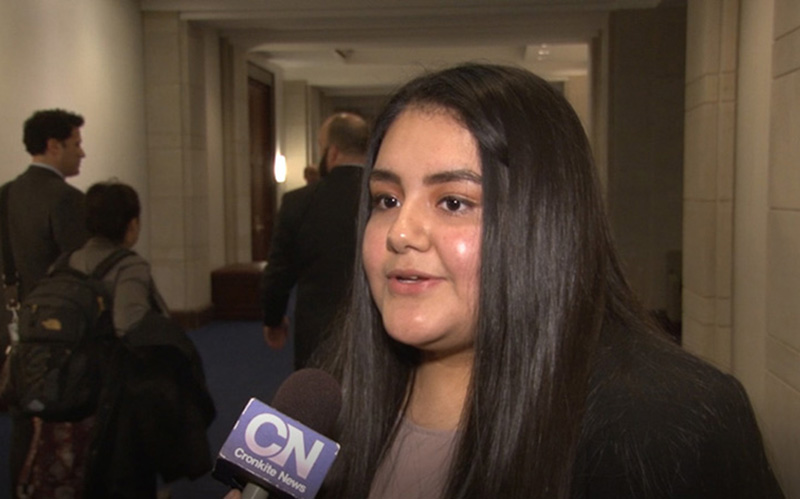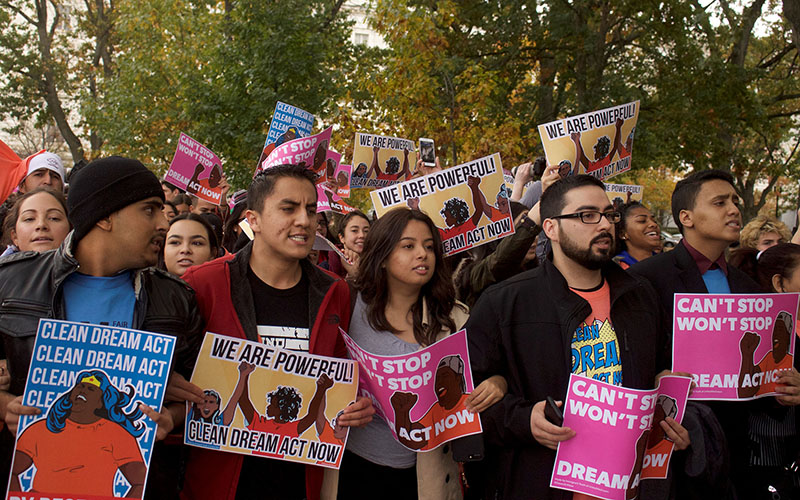WASHINGTON – DACA recipient Juan Escalante has been on a “roller coaster of emotions” since September when President Donald Trump announced plans to end the deferred deportation program.
The roller coaster continued this week after the Senate failed to agree on any DACA measures, despite several days of open floor debate dedicated to the issue.
With the March 5 deadline looming and Congress on recess next week, that leaves just five working days left for a solution before the legal protection goes away for an estimated 800,000 young immigrants who were brought to this country illegally as children.
“I thought this would be it, I really thought something would” be passed, said Arisaid Gonzalez Porras, a DACA recipient from Mesa who described her response as “frustration mixed with anger.”
Escalante called it “extremely disappointing to see Congress act in such a way,” adding that lawmakers’ refusal to comprise should be disappointing to the rest of America.
“I’m not really sure what the answer is,” said Escalante, a Dreamer from Florida.
One expert is not hopeful there can be a deal, at least in the short term.
David Bier, an immigration policy analyst for the Cato Institute, said the prospect of a DACA bill passing was doomed after Trump tweeted Thursday that a bipartisan Senate bill was “a total catastrophe.” That bill ended up getting the most votes of the three that were taken up in the Senate, but still fell shy of the 60 votes needed to head off a procedural filibuster.
Bier said that after the president’s tweet, there was “no incentive for Republicans to buck the president” by voting yes on a bill that had no chance of becoming law.
Thursday’s votes capped a week in which the Senate debated bills ranging from Trump’s preferred plan – giving a pathway to citizenship for up to 1.8 million Dreamers in exchange for border wall funding and tightening family migration – to a bill by Sens. John McCain, R-Arizona and Christopher Coons, D-Delaware. Their plan, mirroring a House bill, would have formalized DACA, providing a pathway to citizenship for a larger pool of people than the president’s plan, and included funds for border security – but no wall.
A bill from Sens. Mike Rounds, R-South Dakota, and Angus King, I-Maine, was seen as a middle ground between McCain-Coons bill and the White House plan. It would have provided $25 billion for a border wall, prevented green card holders from sponsoring their adult children and created a 12-year path to citizenship for Dreamers, while asking immigration enforcement agencies to not pursue illegal immigrants who don’t have criminal records.

Arisaid Gonzalez Porras, a DACA recipient from Mesa, said she felt “frustration mixed with anger” when senators failed to reach an immigration deal. (Photo by Ariana Bustos/Cronkite News)
That bill won 54 votes, not enough to block a filibuster but still more than the 52 for McCain-Coons and the 39 for the administration-backed plan.
“I think the 60 votes were there had the president not … fought against” the Rounds-King bill, Bier said.
In a tweet Friday morning, Trump blamed Democrats for the lack of action, saying they “totally abandoned” DACA recipients and that Republicans were still “working hard.”
But Bier placed the blame directly at the president’s feet.
“He’s really done more than anyone else to prevent a deal,” Bier said. “Throughout this process, the president has consistently moved the goal posts for reform.”
Petra Falcon, executive director of Promise Arizona, accused Republicans of “holding young people hostage,” by offering them a path to citizenship while breaking up their families, by ending the family migration program.
Escalante, the communications manager for the pro-immigrant group America’s Voice, said the president and Republican congressional leadership were just feigning support for Dreamers in an attempt to push their own agenda.
Failure of the bills this week is “hard proof that … they say they love Dreamers (but) they just want to use us as pawns to pass their immigration platform,” Escalante said.
Despite the looming March 5 deadline for the Deferred Action for Childhood Arrivals program, two courts have reopened the process by which Dreamers apply for protection. And Sen. Jeff Flake, R-Arizona, said this week he would push for a three-year extension of the program along with three years of funding for border security that the administration wants.
Meanwhile, Dreamers like Escalante and Porras can only wait.
Escalante, who has been in the U.S. since he was 11, said Congress’ inaction this week has caused fears of deportation to spread among DACA recipients.
Porras, a freshman at Georgetown University, said the debate over her future has affected her ability to study, because she can’t concentrate on her studies with the issue constantly in the news. Additionally, she said, “I don’t feel that safety … everyone who’s in America should feel.”
Porras said she will keep fighting to spread awareness and build support for DACA recipients. She refuses to “hide in the shadows,” but instead will tell her story.
“They crushed our hopes momentarily, but we have to keep fighting,” she said.
